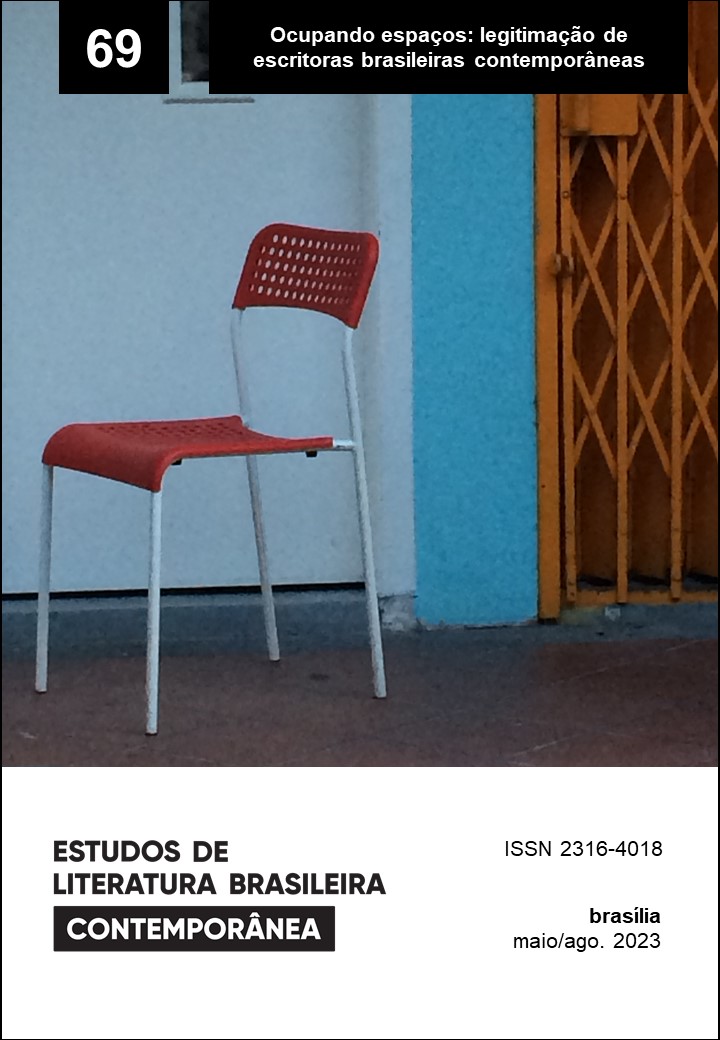Writing with the whole body by Laura Castro
Keywords:
contemporary Brazilian literature; expanded literary field; book-objectAbstract
This work is dedicated to the literary production of Laura Castro, a novelist, poet, visual artist from Bahia, Brazil, as well as a curator and a teacher, whose artistic practices scrutinize the modes of expansion of the Brazilian literary field. This enlargement takes place both with regards to the publication and circulation of the book and to a literature marked by not belonging to a single genre, making experimentation, hybridization, and the use of different supports its constituent traits. To do so, at first, this text assesses how the “collective gathering”, characteristic of the author's works, establishes independent collaboration circuits. Subsequently, it comments on Castro's last two books, O armarinho (2018) and Inês: pequena antologia do passado (2020), to assess their transit (of supports, genres, forms), in which the experiments and intimate experiences of the first are consolidated in a more synthetic language that opens up to questions of inheritance, of ancestry, and of erasure of the past. Authors as diverse as Derrida, Garramuño, Devulsky, and Munanga help develop this reflection.
Downloads
References
BETHÂNIA, Maria. Drama Rio de Janeiro: Philips, 1972.
CALVINO, Italo (2010). Seis propostas para o próximo milênio: lições americanas. Tradução de Ivo Barroso. São Paulo: Companhia das Letras.
CAMÕES, Luiz de (2018). Os Lusíadas 2. ed. Rio de Janeiro: Nova Fronteira.
CAMPOS, Augusto de; CAMPOS, Haroldo de; PIGNATARI, Décio (2013). Mallarmé São Paulo: Perspectiva.
CASTRO, Laura (2011). Cabidela: bloco de máscaras.
CASTRO, Laura (2013). Fio condutor
CASTRO, Laura (2014). O telefone tocou novamente São Paulo: Maloqueiristas.
CASTRO, Laura (2016). Pé de palavra Salvador: Sociedade da Prensa/EDTÓRA.
CASTRO, Laura (2018). O armarinho / seguido de Fique são. Salvador: Sociedade da Prensa/EDTÓRA.
CASTRO, Laura (2019). Portifólio. Issuu Disponível em: https://curt.link/8rqe3c Acesso em: 20 dez. 2022.
CASTRO, Laura (2020). Inês: pequena antologia do passado. Salvador: Incubadora de Publicações Gráficas.
CASTRO, Laura (2021). Entre irmandades e coletivos: práticas editoriais de mulheres negras na Bahia. Revista de Estudos de Edição, Belo Horizonte, v. 1, n. 1, p. 67-83. Disponível em: https://curt.link/s7iCnf Acesso em: 20 dez. 2022.
CASTRO, Laura; OLIVEIRA, Flávio; RIBEIRO, Tiago (2017). Ympressos paraguassu Salvador: Sociedade da Prensa/EDTÓRA.
DERRIDA, Jacques (2012). Pensar em não ver: escritos sobre as artes do visível. Organização de Ginette Michaud, Joana Masó e Javier Bassas. Tradução de M. J. de Moraes. Florianópolis: Editora da UFSC, 2012.
DEVULSKY, Alessandra (2021). Colorismo São Paulo: Jandaíra.
DIDI-HUBERMAN, Georges (2011). Sobrevivência dos vaga-lumes Tradução de Vera Casa Nova e Márcia Arbex. Belo Horizonte: Editora UFMG.
GARRAMUÑO, Florencia (2014). Frutos estranhos: sobre a inespecificidade da estética contemporânea. Tradução de Carlos Nougué. Rio de Janeiro: Rocco.
HOOKS, bell (2019). Olhares negros: raça e representação. Tradução de Stephanie Borges. São Paulo: Elefante.
MUNANGA, Kabengele (2020). Negritude: usos e sentidos. Belo Horizonte: Autêntica.
ONDJAKI (2013). Uma escuridão bonita São Paulo: Lis Gráfica.
PEDROSA, Celia; KLINGER, Diana; WOLFF, Jorge; CÁMARA, Mario (org.) (2018). Indicionário do contemporâneo Belo Horizonte: Editora UFMG.
SANTOS, Elizangela (2016). O livro-objeto de Laura Castro Disponível em: https://curt.link/2HxvzU Acesso em: 16 abr. 2023.
Downloads
Published
How to Cite
Issue
Section
License

This work is licensed under a Creative Commons Attribution-NoDerivatives 4.0 International License.
Authors who publish in this journal agree to the following terms:
a) The authors maintain the copyright and grant the journal the right of first publication, the work being simultaneously licensed under the Creative Commons Attribution License-Non Commercial 4.0 which allows the sharing of the work with acknowledgment of the authorship of the work and publication this journal.
b) Authors are authorized to enter into additional contracts separately, for non-exclusive distribution of the version of the work published in this journal (eg publish in institutional repository or as a book chapter), with authorship recognition and publication in this journal.
c) Authors are allowed and encouraged to publish and distribute their work online (eg in institutional repositories or on their personal page) after the editorial process, as this can generate productive changes, as well as increase the impact and citation of published work (See The Effect of Free Access).
d) The authors of the approved works authorize the magazine to, after publication, transfer its content for reproduction in content crawlers, virtual libraries and the like.
e) The authors assume that the texts submitted to the publication are of their original creation, being fully responsible for their content in the event of possible opposition by third parties.


